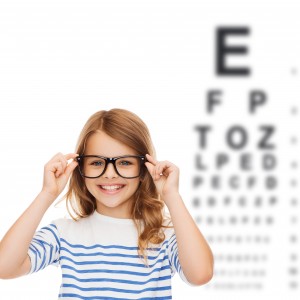 A study recently published in the journal Optometry and Vision Science supports the use of specific “retainer” contact lens for myopia correction in children. The study is entitled “Orthokeratology for Myopia Control: A Meta-analysis.”
A study recently published in the journal Optometry and Vision Science supports the use of specific “retainer” contact lens for myopia correction in children. The study is entitled “Orthokeratology for Myopia Control: A Meta-analysis.”
Myopia (or nearsightedness) is the most common refractive error of the eye and its prevalence has increased in the past years, with rates of around 20 to 50% in the United States and Europe, and 70% or higher in East Asia. Children often have a progressive form of myopia that can persist into adulthood, which, in severe cases, can be a risk factor for eye disorders such as retinal detachments, glaucoma and cataracts.
Orthokeratology, also known as Ortho-K, is a relatively new technique where the individual (usually a child) wears custom-made contact lenses overnight that temporarily reshape the eye’s cornea to reduce refractive errors like myopia. Ortho-K lenses guide the gradual growth of the eye and have been previously suggested to contribute to slow myopia progression that in turn can mitigate the chances for developing cataracts and other eye-related disorders.
In this study, a meta-analysis was conducted to determine the effects of Ortho-K in slowing myopia progression. For this purpose, researchers examined data collected from seven previous studies on the employment of Ortho-K to treat myopia in children; five of these studies were conducted in East Asia. A total of 435 children aged 6 to 16 years with mild to moderate myopia were assessed and the axial length (the length of the eye from front to back) was determined, as it is a key measure of eye growth related to myopia development. The follow-up time in all studies was 2 years.
Researchers found that the axial length of the eye increased as children grew, independently of the use of Ortho-K. Two years after, however, it was found that children wearing Ortho-K exhibited a slower increase in axial length indicating a slower myopia progression. When analyzing the vitreous chamber depth, an alternative measure of eye growth, the team found a similar differences between children using Ortho-K and those without it.
“Most critically for myopia progression is the impact in retarding the growth of the eye, not just reshaping the cornea” said the Editor-in-Chief of Optometry and Vision Science, Dr. Anthony Adams, in a news release. “They conclude, with even greater confidence, that orthokeratology does certainly slow myopia progression and retard the axial length growth of the eye.”
Ortho-K is a promising approach to slow myopia progression in children, leading to potentially healthier eyes in the long term. The mechanism behind Ortho-K’s effect is not clear though, and researchers emphasize that further studies are required to determine its mechanisms of action. Randomized trials with larger cohorts of children should also be performed to assess the long-term benefits of Ortho-K use in myopia control.


